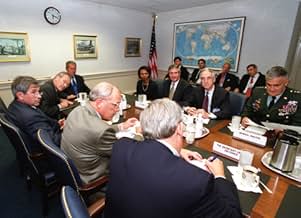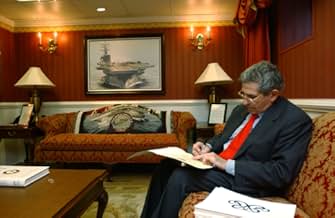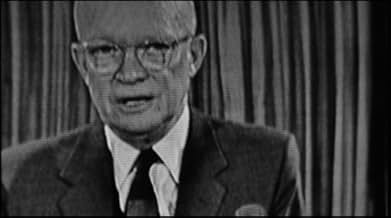Agrega una trama en tu idiomaIs American foreign policy dominated by the idea of military supremacy? Has the military become too important in American life? Jarecki's shrewd and intelligent polemic would seem to give an... Leer todoIs American foreign policy dominated by the idea of military supremacy? Has the military become too important in American life? Jarecki's shrewd and intelligent polemic would seem to give an affirmative answer to each of these questions.Is American foreign policy dominated by the idea of military supremacy? Has the military become too important in American life? Jarecki's shrewd and intelligent polemic would seem to give an affirmative answer to each of these questions.
- Dirección
- Guionista
- Elenco
- Premios
- 4 premios ganados y 3 nominaciones en total
- Self
- (material de archivo)
- Self
- (material de archivo)
- Self
- (material de archivo)
- Self
- (material de archivo)
- Self
- (material de archivo)
- Self
- (material de archivo)
- Self
- (material de archivo)
- Self
- (material de archivo)
- Self
- (material de archivo)
- Dirección
- Guionista
- Todo el elenco y el equipo
- Producción, taquilla y más en IMDbPro
Opiniones destacadas
Why we Fight presents a lyrical and devastatingly haunting portrait of a system that has failed the west - specifically America - time and time again in a repeating cycle. The narrative carefully builds an historical context for the present administration's actions, and unfolds a story of how Americans, even the most staunch supporters of Bush's policies, have gradually learnt that they've been lied to, lied about and then lied to again as the administration is called on to answer for their lies.
With extraordinary research, and some incredible interview contributors, the facts are again repeated - indeed, they gain, perhaps even greater impact because of the historical context - and the warnings of past leaders.
It is above all a film which at once makes you terribly sad - and frustrated. But the surprise - for me at least - was that my anger became levelled not so much at the arrogance of our governments, and those in the positions of power - but at the stupefying inaction of the voting public.
I need only direct you to another of the 'reviews' of this film to underline just how poisoned the populous is, and just how stupid people have allowed themselves to become.
-------- The director spoke at Sundance about how he consciously prevented this breathtaking documentary from being screened before the election in 04 - largely because he felt the message of the film is not partisan, and not about a particular administration - but it is about the system. My only frustration about this is that I can only imagine what the snowballing effects of this film might have been had it been allowed to swiftly follow 'Fahrenheit 911'.
Why We Fight is everything that F9/11 is not. Where F911 told, WWF explains. Where F911 ridicules, WWF allows items of fact speak for themselves. Why We Fight makes the assumption that its audience is educated and capable of examining multiple facets of an issue without resorting to unnecessarily polar characterizations of people or ideas. Just to be clear: WWF's take on these issues is unmistakable, but if F911 is a declaration, WWF is fundamentally a question.
Why We Fight asks its audience to consider Eisenhower's presidential farewell address, and amount of it he devoted to warning against the rise of the "military-industrial complex," coining a new phrase.
"This conjunction of an immense military establishment and a large arms industry is new in the American experience. The total influence -- economic, political, even spiritual -- is felt in every city, every State house, every office of the Federal government. We recognize the imperative need for this development. Yet we must not fail to comprehend its grave implications. Our toil, resources and livelihood are all involved; so is the very structure of our society." (1961)
Viewers of Why We Fight are consistently returned to this warning as they are reminded of the last fifty years of American military conflicts.
We are introduced to an ex-NYPD cop, Vietnam vet and father of a 9/11 victim who wants revenge on the bastards who killed his son. We meet an Air Force Lt. Colonel who resigned her post in intelligence at the Pentagon when political urgencies began to warp and distort her work of 20 years. The pilots who dropped the first bombs on Baghdad in 2003 talk about their mission. We hear commentary from think-tankers Bill Kristol and Richard Perle, and candid reservations about American military power from Senator John McCain. All have something valuable to say about the conflict in which the United States is engaged.
Fundamentally Why We Fight asks questions of involvement and influence: who are the players, what are their interests, and what are the stakes? It's not about one man, a group of men, or a political party. There are no conspiracy theories; merely a serious question. How much military might is necessary? Given the amount of money spent on defense, the number of jobs the industry provides, the numbers of congressmen in office due to contracts being brought home to their constituents, should we be concerned how the business of war drives the politics for war? Are the needs of a defense corporation different than those of humans? Who is in control, and how much power should they have?
On the surface, the movie is about how we got into Iraq. Deeper, it is asking what the future holds: American military supremacy? For how long? How long did the English or the French or the Soviets hold on to their hegemonies? Just how did we get from Iranians, Jordanians and Frenchmen proclaiming "we are all Americans" in the days following 9/11, to being seen around the globe as the single biggest threat to peace in the world? Can we ever get back?
Richard Perle makes a statement I found chilling largely because I find it hard to disagree. He says something to the effect of, "people think that you can just elect a new man to office, and everything will change. It's already a different world. We have already changed." The degree of truth of that statement is worthy of debate, and that's why I wholeheartedly recommend this movie.
This movie explains the historic, financial and political reasons for America's enormous military spending (but I'm still left wondering why the people of USA want it).
Eisenhower's farewell speech was very insightful. I had no idea he had seen the dangers already 40 years ago. Using this speech as the base, the filmmaker looks at how the military-industrial establishment has grown to enormous proportions. The military is a part of American society in a way completely different from most European countries.
I would like to see a sequel to this movie, dealing more with American society, perhaps contrasting it with some other big countries (England, France, Germany).
¿Sabías que…?
- Citas
Joseph Cirincione: In some ways, the military-industrial complex may become so pervasive that it is now invisible. This is about, you know, ideas and influence and what's safe for your career. Being seen in opposition to strong defense policies is a liability. Not just for a politician who wants to run for president, but for an expert who wants to make a name in town, or a journalist who wants to get his or her story on the front page of the paper. In this way, restricting the level of discussion to this rush for war.
- ConexionesFeatured in The Daily Show: Eugene Jarecki (2006)
Selecciones populares
- How long is Why We Fight?Con tecnología de Alexa
Detalles
- Fecha de lanzamiento
- Países de origen
- Sitio oficial
- Idiomas
- También se conoce como
- За что мы сражаемся
- Productoras
- Ver más créditos de la compañía en IMDbPro
Taquilla
- Total en EE. UU. y Canadá
- USD 1,439,972
- Fin de semana de estreno en EE. UU. y Canadá
- USD 53,571
- 22 ene 2006
- Total a nivel mundial
- USD 1,439,972
- Tiempo de ejecución
- 1h 38min(98 min)
- Color
- Mezcla de sonido
- Relación de aspecto
- 1.85 : 1





















